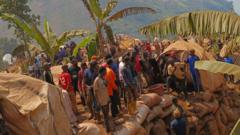As the US seeks to address ongoing conflicts in the Democratic Republic of Congo through a peace deal involving mineral-rich resources, concerns arise over potential compromises in sovereignty and the long-term consequences for the region's stability and its people.
Trump’s Peace Initiative in DR Congo: A Path to Mineral Wealth or New Exploitation?

Trump’s Peace Initiative in DR Congo: A Path to Mineral Wealth or New Exploitation?
The Trump administration is navigating a complex peace process between DR Congo and Rwanda, with significant implications for the US's mineral supply needs and the region's stability.
In a bold move underscored by geopolitical interests, the Trump administration is spearheading a controversial peace initiative aimed at quelling the longstanding conflict in eastern Democratic Republic of Congo (DRC) and its ties to neighboring Rwanda. The efforts are driven by DRC's vast mineral wealth, which the United States views as critical to its technology and energy sectors, especially in a time when China is aggressively acquiring similar resources.
Scheduled for an upcoming summit, President Trump is set to meet with DRC's President Félix Tshisekedi and Rwanda's President Paul Kagame, with the objective of finalizing a peace agreement that Trump has praised as a monumental success. Analysts, like Prof. Alex de Waal from the World Peace Foundation, highlight that this approach blends diplomatic mediation with commercial ambitions, echoing similar strategies used in Trump's dealings with Ukraine.
However, experts caution that the U.S. may be reclaiming a position in a race already marked by significant Chinese investment. The safety concerns surrounding investment in DRC—often labeled as dealing with "blood minerals" due to their ties to conflict—have kept American firms at bay. This new peace framework, if effectively implemented, could attract U.S. capital but raises questions about the long-term implications for DRC's autonomy and economic agreements.
Prof. Hanri Mostert from the University of Cape Town warns that such agreements might lead to detrimental compromises on sovereignty over the DRC's mineral resources. Questions are also raised regarding the duration and terms of these agreements, echoing historical patterns seen in resource-rich nations like Angola, where countries failed to capitalize on fluctuating commodity prices.
The recent resurgence of violence from the M23 rebel group has complicated the landscape. Reports suggest that the rebels have engaged in smuggling operations, exporting minerals across the Rwandan border. Both governments acknowledge this illicit activity and appear to be working towards a "regional economic integration framework" aimed at curbing these practices.
This initiative runs parallel to mediation efforts spearheaded by Qatar, which has significant economic interests in the region and is in talks to develop major infrastructure projects in Rwanda. The intertwining of U.S. and Qatari efforts underscores the complexity of regional diplomacy, especially in light of the M23's enduring presence and resistance to relinquishing control over captured territories.
The peace deal, signed on June 27, outlines steps for immediate security collaboration between DRC and Rwanda, but experts like Onesphore Sematumba from the International Crisis Group caution that the transition to lasting peace is fraught with challenges. Historical grievances, the intricate dynamics of rebel factions, and the commitments required from both Rwanda and the DRC will necessitate ongoing mediation efforts beyond mere agreements.
The resolution to this peace process may hinge on cooperative negotiations concerning the armed groups, particularly the FDLR—an entity responsible for historical atrocities—whose neutralization is a primary concern for Rwanda. The U.S. administration will need to navigate these sensitive issues carefully if it wishes to avoid the pitfalls that have plagued past peace initiatives.
As the situation unfolds, there remains an urgent need for a comprehensive approach that acknowledges the deep-rooted traumas and aspirations of the Congolese people. For the Russian and American interests to prosper in DRC's mineral wealth, the long-standing issues must be addressed beyond diplomatic formalities, ensuring that the peace achieved lasts long enough for mutual benefits to be reaped.





















